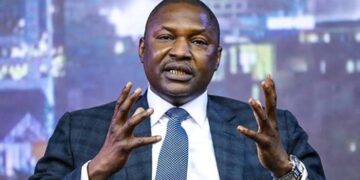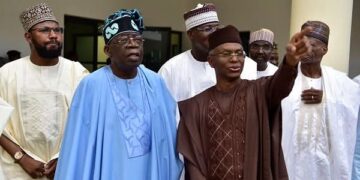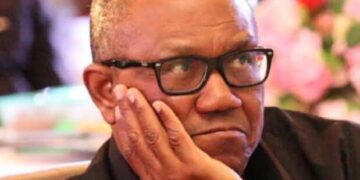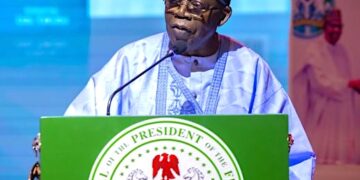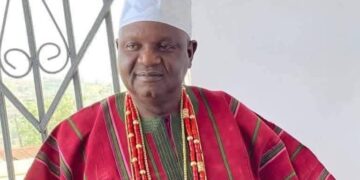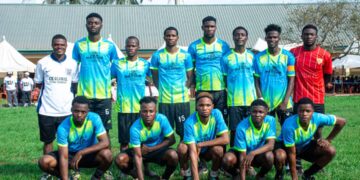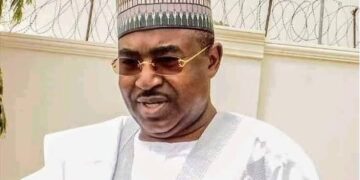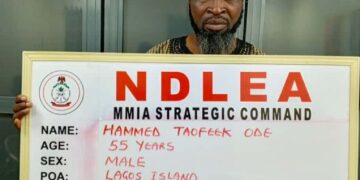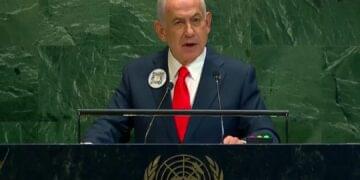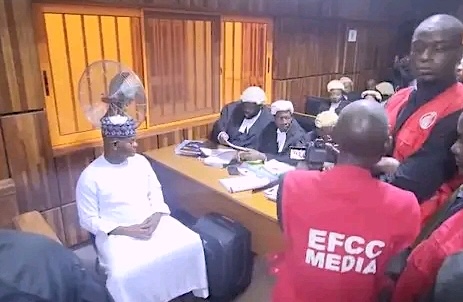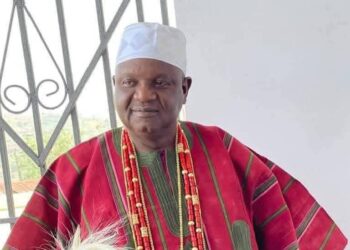The trial of former Kogi State Governor, Alhaji Yahaya Bello, continued on Wednesday at the High Court of the Federal Capital Territory (FCT), Maitama, with the Economic and Financial Crimes Commission (EFCC) presenting additional witnesses to substantiate its case.
Bello, who governed Kogi State between 2016 and 2024, is facing a 16-count charge of alleged money laundering filed by the anti-graft agency. He is being prosecuted alongside two former state officials, Umar Shuaibu Oricha and Abdulsalami Hudu, over their alleged involvement in a N110 billion fraud.
Taking the stand as the third prosecution witness (PW-3), bank official Ms. Williams Abimbola provided insight into several transactions linked to the case, according to Vanguard.
Identifying herself as a Compliance Officer with the United Bank for Africa (UBA), Abimbola told the court that all transactions involving her bank “followed the due banking process.”
She maintained that “no regulation was breached in the transactions that were allowed by her bank.”
The witness explained that she had earlier testified in a related case before the Federal High Court in Abuja, suit number FHC/ABJ/CR/98/2024, involving the Federal Republic of Nigeria and the former governor, Bello.
While noting that she represented the bank in court, she clarified that she was not the manager of the Kogi Government House account, which she said was domiciled in Lokoja.
During cross-examination by Bello’s lead counsel, Mr. J.B. Daudu, SAN, Abimbola stated that part of her duties was to safeguard the bank’s integrity “to avoid legal penalty, reputational damage and financial loss.”
Citing exhibits before the court, she confirmed that one of the defendants, Hudu, made multiple withdrawals of N10 million each between July 31 and August 6, 2019.
However, she said she was “not in the position to ascertain why the withdrawals were made by the defendant.”
Abimbola explained that while banks sometimes inquire about the purpose of large transfers, “the bank does not make such enquiries in the case of cash withdrawals.”
She added that “a banker does not act as an internal auditor for customers.”
She also confirmed that “transfers were made from the account in tranches, on July 5, 2019, by one Bello Abdullateef,” maintaining that the bank did not breach any rule in processing them.
According to her, “none of the withdrawals in the proof of evidence exceed N10m,” adding that as a banker with over 19 years of experience, she understood that the duties of a cashier “included paying cash and receiving cash.”
The witness stressed that “a customer was at liberty to withdraw his money as much as he liked, so far the payment mandate was correct.”
Under cross-examination by counsel for the third defendant, Mr. A.M. Aliyu, Abimbola was shown a bank statement reflecting the withdrawals.
She admitted that the narration on the credit entry was “the governor’s security fund,” noting also that it contained “a credit entry of N100m in two tranches of N50m each.”
When asked if she could swear that the funds were not used for security purposes after withdrawal, Abimbola replied: “My Lord, I am not privy to the details of the transaction and cannot categorically answer that question.”
She further testified that she had never met or had any business relationship with the second defendant, Oricha, nor had she met the first defendant, Bello.
SaharaReporters earlier reported that on Thursday, June 26, 2025, a prosecution witness revealed in court how over ₦1.09 billion was withdrawn from the Kogi State Government House’s Administration Account within three days, amid the ongoing trial of the former governor.
Testifying before Justice Emeka Nwite of the Federal High Court in Maitama, Abuja, the witness, Mashelia Arhyel Dada, a compliance officer at the Zenith Bank Maitama Branch, provided a detailed account of multiple questionable transactions linked to the alleged financial misconduct.
Dada, who appeared as the fourth prosecution witness (PW4), was summoned under a subpoena.
Led in evidence by prosecution counsel, Prof. Kemi Pinheiro (SAN), Dada explained that his testimony was based on seven sets of documents submitted in response to the subpoena served on the bank’s managing director.
The documents were admitted into evidence as Exhibits 20 to 24C.
Among the key accounts examined were those operated by individuals and corporate entities, including Adamu Jagafa Ishaya, Whales Oil and Gas, Jimeda Properties Nigeria Limited, Alyeshua Solutions, and, critically, the Kogi State Government House’s Administration Account.
Pinheiro drew the court’s attention to what he described as a flagrant violation of the Central Bank of Nigeria’s (CBN) cashless policy.
SaharaReporters.


